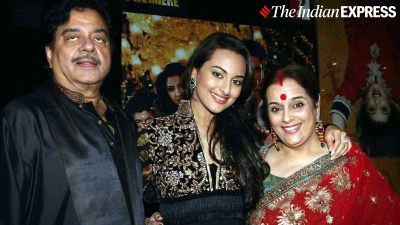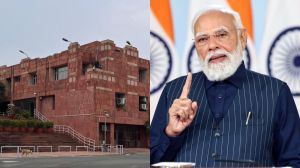Click here to follow Screen Digital on YouTube and stay updated with the latest from the world of cinema.
Kishore Kumar, the reluctant actor: Eccentric genius who ‘screamed, ranted, pretended to be crazy’ to avoid acting
On his 94th birth anniversary, we revisit how a fan of KL Saigal, Kishore Kumar only wanted to make it big as a singer in the industry and never wanted to act. Yet, he gained popularity as a masterful comedian, romantic hero and tragic hero.
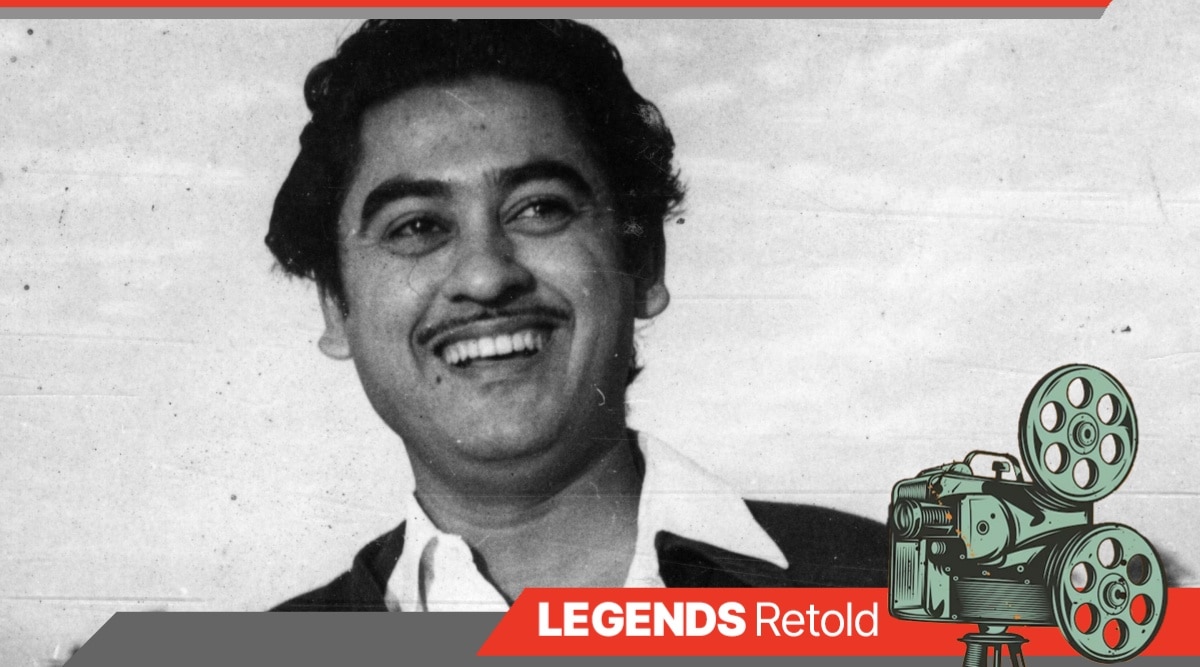 Kishore Kumar, born on August 4, 1929, became an actor only on brother Ashok Kumar's insistence. (Express Archive Photo)
Kishore Kumar, born on August 4, 1929, became an actor only on brother Ashok Kumar's insistence. (Express Archive Photo) ‘Acting jhoothi hoti hai.’
These words came from one of Indian cinema’s most popular multihyphenate, Kishore Kumar, a man who left viewers gasping for breath with his unmatchable energy in comedy capers such as Chalti Ka Naam Gaadi, Half Ticket, Jhumroo, Padosan, and Pyar Kiye Jaa. He also won hearts with sensitive portrayals such as Door Gagan Ki Chhaon Mein, Door Ka Raahi, Andolan, and Naukri.
Despite his ability to become the character he played, he once told Lata Mangeshkar, “Main acting karna nahi chahta tha (I never wanted to act). But my elder brother Ashok Kumar asked me to do it. I said, ‘Dadamuni, merko acting mat karvao, acting jhuthi hoti hai, sangeet dil se nikalta hai aur jo dil se nikle vo dusron ke dilon tak pohnchta hai’ (Don’t make me act, acting is a lie. Music comes straight from the heart and reaches the heart of others). I prefer singing over acting.” He obviously failed to win over his elder brother with his argument and his fans will thank Ashok Kumar for this.
They would listen to his “Khwab ho tum ya koi haqeeqat”, “Pal pal dil ke paas”, “Khaike paan Banaraswala”, “Khilte hain gul yahan” and “Kya yehi pyar hai” with as much zeal and admiration as they would watch him play the paan-chewing ‘ustaad’ to Sunil Dutt’s Bhola in Padosan or as an aspirational everyman youth in Bimal Roy’s Naukri or as a father yearning to hear his speech-impaired son in his directorial debut Door Gagan Ki Chhaon Mein (1964).
However, before being recognised as an actor who could be a comedian, tragic hero and romantic hero with aplomb, Kumar tried to sabotage his acting career, which began with the 1946 film Shikari. A fan of KL Saigal, Kishore only wanted to make it big as a singer in the industry. But his elder brother Ashok Kumar, who was already a superstar when Kishore came to Bombay, was adamant that he would act and not sing since his brother had no professional training in singing and Talat Mehmood, Mukesh and Mohammed Rafi were established singers at the time. Kishore could not say no to his brother, but what he could do was act badly in the film so nobody would cast him again.
“I hated every moment of it and tried virtually every trick to get out of it. I muffed my lines, pretended to be crazy, shaved my head off, played difficult, began yodelling amid tragic scenes, told Meena Kumari what I was supposed to tell Bina Rai in some other film – but they still wouldn’t let me go. I screamed, ranted, went cuckoo. But who cared? They were just determined to make me a star,” he told Pritish Nandy during a conversation in 1985. And, why were they determined to do so? He said, “Because I was Dadamoni’s brother and he was a great hero.” Since Ashok Kumar had put a word about his brother to the producers, some would even bribe him, “If you act, then we will give you one song in the film.”
Between 1946 and 1953, Kumar went largely unnoticed as an actor. His presence was overshadowed by mavericks like Dilip Kumar, Raj Kapoor and Dev Anand. He eventually found support from filmmakers who loved his instinctive and natural acting. For his success as an actor, Kishore often credited director MV Raman who encouraged him after seeing his expressions and body language while singing for his film Bahar. Raman cast him in his next production Ladki and then on, there was no looking back.
Bimal Roy made a rare choice of casting him in socio-political drama Naukri as an educated young boy who finds it difficult to find employment. Recalling the moment of casting Kishore, Rinki Roy Bhattacharya, daughter of Bimal Roy was quoted as saying in ‘Kishore Kumar: The Ultimate Biography’, “It was a very grim subject, and he (Bimal) wanted to lighten the whole thing by having someone like Kishore.”
By 1955, Kishore Kumar became one of the busiest actors and playback singing took a backseat. Manna Dey called him “India’s answer to Danny Kaye” as he won hearts with comedy, song and dance. His 1958 film, Chalti Ka Naam Gaadi that brought together the three Kumar brothers – Ashok, Anoop and Kishore – remains one of the finest comedies in Indian cinema. Baap Re Baap, New Delhi, Naya Andaz, Miss Mary, Begunah, Dilli KaThug and Munimji are some of his other popular films.
While the audience loved him for his on-screen peculiarity, he was popular in the film circle for his unpredictable behaviour. Romantic scenes remained a problem for him and he was the only actor in the 1950s who refused to hug the leading ladies.
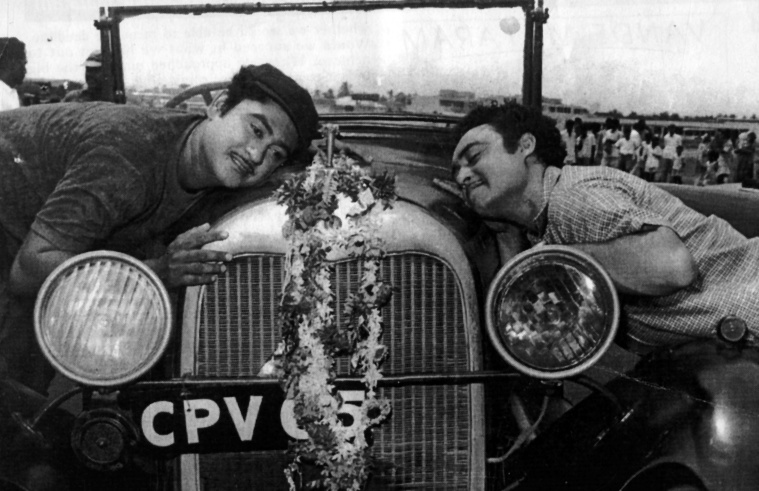 Actor Kishore Kumar and Anup Kumar in Chalti Ka Naam Gaadi. (Express archive photo)
Actor Kishore Kumar and Anup Kumar in Chalti Ka Naam Gaadi. (Express archive photo)
Ironically, though a reluctant actor, he would be deeply affected if his films didn’t get a good response. He was upset when Door Wadiyon Mein Kahin received negative reviews. To become successful, he asked his brother (Ashok Kumar) to star alongside him in Bhai Bhai, a film that showcased the story of ‘bachpan ke bichde bhai’. During his career, Kishore realised that more ‘stupid’ a film, more takers it would get. He once told Filmfare, “I don’t intend to stop working in stupid pictures. No sensible pictures for me. The more fantastic a picture is, the more incoherent its plot, the better it runs! … It’s better to work in stupid pictures which click than in [an] intelligent picture which flops.”
Another realisation that struck him was, ‘The only thing that matters in the world is money.’ Kishore Kumar never let a penny go that legitimately belonged to him. He told Filmfare in 1958, “I don’t care whether people call me a miser. People revile you when you have no money and are jealous of you when you do. I’d rather have them jealous.” And, to get money out of the producers of his films, he resorted to weird antics.
The producer of Mem Sahib, RC Talwar owed him money and despite repeated reminders, didn’t pay him. As narrated in ‘Kishore Kumar: The Ultimate Biography’, Kishore Kumar turned up at Talwar’s residence one morning and started shouting ‘Hey Talwar, de de mere aath hazaar’ (Hey Talwar, give me my eight thousand). He did this every morning for a few days until he got his money. In a similar incident, he turned up with makeup on half of his face because the producer had paid only half of his dues. On the sets of MV Raman’s Bhai Bhai, he did somersaults as Raman owed him Rs 5000 and left the set without completing the shoot.
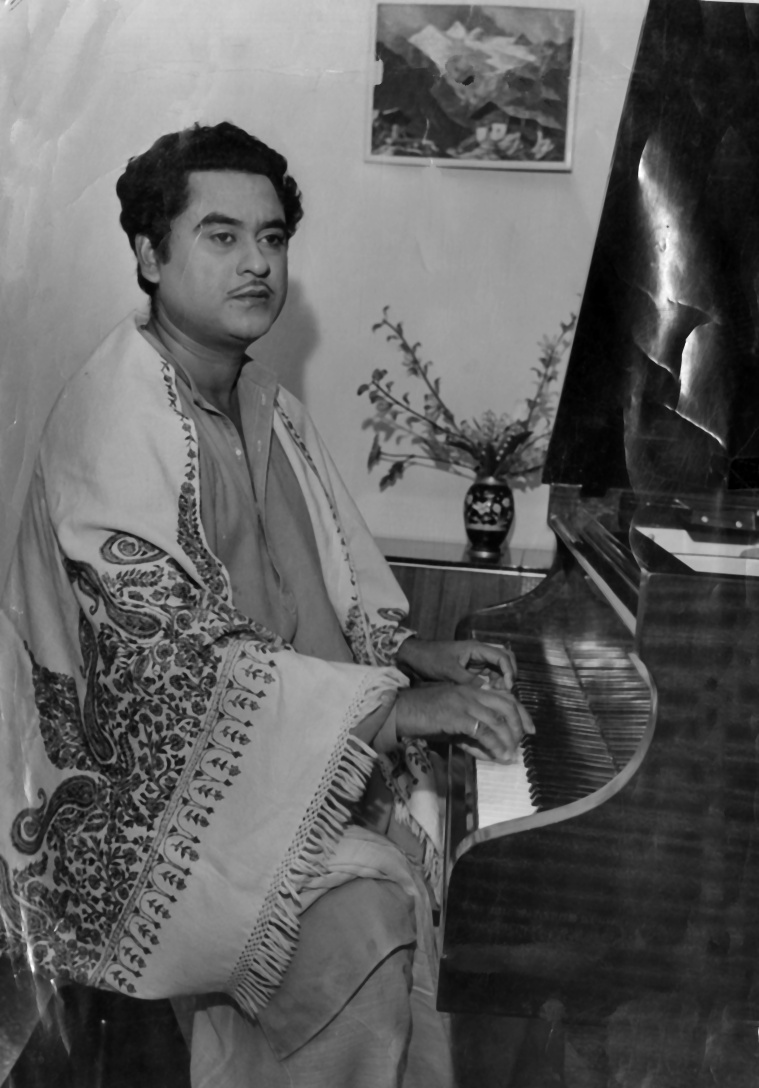 Kishore Kumar died on October 13, 1987. Express archive photo
Kishore Kumar died on October 13, 1987. Express archive photo
In one instance, a director took him to court and obtained a decree that he would follow the director’s instructions and would turn up for work. The director didn’t know what he was getting himself into. Kishore turned up on the sets of the film but didn’t get out of the car until instructed by the director. He also drove to Khandala as the director forgot to call cut!
Kishore Kumar put up a sign board outside his flat which read, ‘Beware Of Kishore’. When director Rahul Rawail’s father HS Rawail, also a well-known producer-director, visited him to pay the money he owed the singer, Kishore took the money and when the latter wanted to shake hands, the singer promptly bit Rawail’s hand. A rather stumped Rawail asked what he was doing, and he replied: “Didn’t you see the sign?”
Every penny mattered to him, which is why he couldn’t get over the fact that he lost a Rs 100 note on the sets of Doctor Dhobhi. Every time he met anyone on the set, he would tell them that he had lost a Rs 100 note. In one of his shots that day, he had to say some romantic things to his female co-star. He did that but added a line, ‘Mera subah se sau rupaya gum gaya jee’ (I have lost hundred rupees in the morning). This continued until lunch and when the producer Chandulal Shah decided to put an end to this by giving him a Rs 100 note, Kishore started saying, ‘Woh sau hote to inhe milakar 200 nahin ho jaate’ (Alas, if I had that 100 rupees, I would now have 200).”
Yet, while he was so particular about his dues, he refused to accept any money from Satyajit Ray after recording a song for Charulata. When Ray asked him his fees, he just touched his feet and didn’t accept anything. When Ray ran into financial trouble during the making of Pather Panchali and even considered dropping the project altogether, Kishore Kumar helped him out with Rs 5,000 and brought him back on track.
And, he never agreed that he made it difficult for the film producer and directors to work with him. He told Pritish Nandy, “They give me trouble. You think they care a damn for me? I matter to them only because I sell. Who cared for me during my bad days?”
It was not only the film producers who had to deal with his moody behaviour, even his co-stars weren’t spared. In a documentary on Kishore Kumar, Pran recalled, “It was difficult to work with him on the set because he would just keep making others laugh. So, we had to request him that this is a serious scene, for god’s sake, please be serious for some time. In Pehli Jhalak, we had a fight scene where I had to punch him in the stomach. MV Raman was the director. Whenever I would hit him, he would instead of showing pain, would start smiling. After 12-14 takes, Raman asked me to do something, or else the shooting would never end. In the next shot, I punched him in real and that is when we got the shot.”
But some even defended his ‘madcap’ acts. In a quote from one of the essays in ‘The Sad and The Glad of Kishore Kumar’, Tanuja reasoned that Kishore’s “eccentricity was more of a facade”. She said, “I don’t know why he put on this madcap act. Maybe as I said, like every other human being, he needed to hide some things. When he was in a good mood, he was great fun.”
Late actor Iftekhar believed that his strange behaviour was an outcome of the demands put in front of him by producers. He noted in the documentary, Life Of Kishore Kumar, “Logon ne usko sankee bana diya, vo itna sankee tha nahi (People had made him eccentric, he was not that eccentric). Producers would come to him with comic roles that would require him to do somersaults at a girl’s house whom he loved. Instead of making him a comedian, people made him a weird mad person. He was not this. He didn’t like this.”
Maybe this was the reason that during his later years, Kishore Kumar wanted to return to his hometown Khandwa in Madhya Pradesh. He believed showbiz doesn’t ‘suit’ him anymore. He didn’t want to die in the “ugly city” where being popular was a “punishable offence”.
He told Pritish Nandy, “Who can live in this stupid, friendless city where everyone seeks to exploit you every moment of the day? Can you trust anyone out here? Is anyone a friend you can count on? I’m determined to get out of this futile rat race and live as I’d always wanted to in my native Khandwa.”
In another interview with journalist Sumit Mitra, he claimed, “Look at the prohibitive taxes for those who are really successful. The tax raids, the complicated laws and bylaws, the hassles – they all make popularity a punishable offence.”
However, destiny had different plans as the actor-director-singer-composer passed away in Bombay on October 13, 1987, with a heart attack. But, as per his wish, his family performed the last rites in Khandwa.
- 01
- 02
- 03
- 04
- 05



